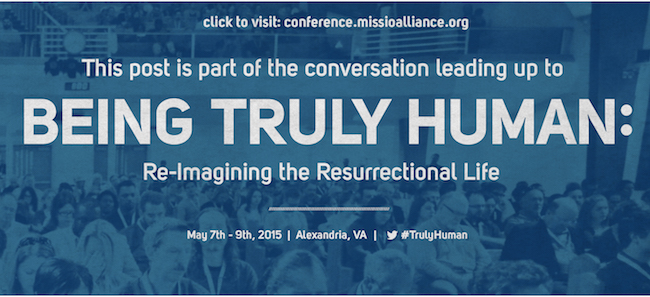We Need a Resurrection Moment: A #TrulyHuman Reflection
This is my #trulyhuman story: It was a moment of brokenness, disrupted by resurrection.
I was standing in the hallway, just outside the emergency trauma room. This call involved a man. Physically beaten by yet another man.
As a part-time hospital chaplain, this was not a new experience. But on this particular day, I became new, I realized my humanity.
The sounds echoing around me seemed to pause time itself. I heard the subdued laughter of the hospital staff; a means of coping with the familiar pattern of broken humanity. I heard the moans coming from the man on the bed; a means of communicating the unspeakable pain. I heard the medical chatter; a means of decision making regarding how to best care for this new patient.
The distinct smells embed the moment in my memory. The taste in the air of stale medical supplies and cleaning chemicals was contrasted with yet another smell; the familiar “homeless” odor wafting from the man on the bed.
His clothes were cut off by the medical team and tossed onto the floor. I stepped into the room and picked them up, but only after putting on a pair of gloves.
I was aware of my intentional separation. Are these gloves fear or disgust? It’s easy to say it’s policy…but I know it’s more.
I checked in the pockets of his clothing, looking for identification. Who is this groaning man? Does he have a family? Parents? Children? What is this man’s story?
There was no identification. No sign of this man’s story. Or perhaps the lack of sign…is this man’s story. I placed his belongings in a paper bag. To be saved and given back to the patient when he would leave the hospital, dead or alive.
As the initial commotion was settling down, I stepped up next to the bed. Uncertain if he would even respond, I spoke loudly, “Sir, what is your name?”
As one eye slowly opened, swollen from the beating he had received, he proudly stated his name; as if it was in defiance to the nameless care he had received up to this point.
“Do you have any family or friends you want me to call for you?” I asked.
“No.” The proud name stating tone turned into a flat response. “Nobody to call. I live life alone.”
I stepped away from the bed. My job here was done. With no family to contact I could leave the details to other staff. I stepped to the side of the room and watched. But then, something happened. This overwhelming awareness of the moment came over me.
It’s hard to define exactly what happened, but in this moment I became suddenly aware that this man did not live alone. I realized this man did have a family and even more important, he and I were part of the same family.
It was such a stunning moment that I laughed aloud. Aware of the absurdity of my own fear, disgust, and dismissal. I was suddenly aware that this was not a homeless man. This was not a patient. This was not a trauma victim. This was my family. My brother. My fellow human being.
And even more than that…the aware doctor, the compassionate nurse, the faithful janitorial team…and the man on the bed; we were all family.
We need an absurdity-of-humanity moment. The gloved separation from our human family is most obviously revealed in our military drones and suburban fences. We quickly deem our enemies as mere targets to bomb, our neighbors as competition to conquer, and our insatiable desires as something to fulfill. Our words (and silence) are filled with hatred and mistrust toward the other. Race, religion, sexual identities, economics and politics serve as label-makers for everyone around us. We do not see humanity…we often only read the assigned labels through our fear-clouded glasses.
We need a resurrection moment. We need the eyes of new humanity that can see broken humanity as what God “so loved.” We need new eyes to see the shining beauty present among the brokenness.
The well-known epiphany moment of Thomas Merton is written in his book, Conjectures of a Guilty Bystander. Merton reflects on his street corner recognition and writes, “It is a glorious destiny to be a member of the human race, though it is a race dedicated to many absurdities and one which makes many terrible mistakes: yet, with all that, God Himself gloried in becoming a member of the human race. A member of the human race! To think that such a commonplace realization should suddenly seem like news that one holds the winning ticket in a cosmic sweepstake.”
Merton summarizes it best as he then writes, “I have the immense joy of being human, a member of a race in which God Himself became incarnate. As if the sorrows and stupidities of the human condition could overwhelm me, now that I realize what we all are. And if only everybody could realize this! But it cannot be explained. There is no way of telling people that they are all walking around shining like the sun.”
—
[Photo: Ewen Roberts, CC via Flickr]



